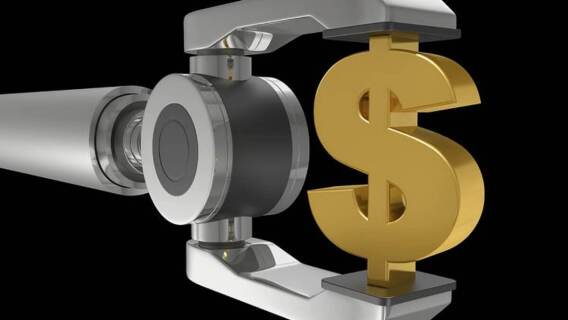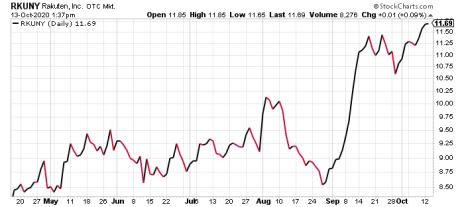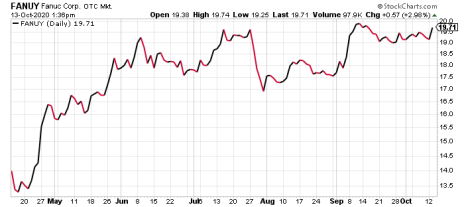Japanese stocks have been out of favor for decades. But Warren Buffett just bought five of them. What does he know?
The dean of global investing, John Templeton, began his famed global stock-picking career scooping up ignored Japanese stocks in the 1960s. In the 1980s, when many thought Japan was an unstoppable economic juggernaut, its stock market delivered an average annual return of 36%.
Then the bubble burst and Japan’s stock market was at best a sideshow, showing some strength and then fading back into the background. Japan’s benchmark index, the TOPIX (short-hand for “Tokyo Stock Price Index”), still sits about 40% below its 1989 peak. The TOPIX is up just 10% in the past five years, against a 64% increase for the S&P 500.
Recently, however, Warren Buffett made a splash by announcing a sizable investment in five blue-chip Japanese stocks:
- Mitsubishi Corp. (MSBHF)
- Mitsui & Co. (MITSY)
- Sumitomo Corp. (SSUMY)
- Itochu Corp. (ITOCY)
- Marubeni Corp. (MARUY)
I can surmise that Buffett is dipping his toe in Japan for a number of reasons, the first being that Japanese stocks are trading at bargain prices.
[text_ad]
The TOPIX trades for less than 15 times earnings, compared with a price/earnings ratio of about 21 times for the S&P 500, and the TOPIX trades for 1.2 times book, versus 3.9 times for the S&P.
Therefore, Japan is likely to offer investors lower downside risk than the high-flying tech darlings in America. Buffett being the world’s foremost value investor, this surely played into his calculations. Finally, with the U.S. dollar weakening over the last few months, Buffett is betting that this trend will continue.
I suggest that you follow Buffett’s lead, and perhaps have the opportunity to do even better than the “Oracle of Omaha,” by considering two Japanese stock ideas that are off the radar screen of most investors.
Japanese Stock #1: Rakuten (RKUNY) – The Amazon of Japan
With markets a bit on edge these days, it makes sense to move to a high quality, conservative play that is in an uptrend (see chart below), with plenty more upside potential.
Rakuten is a well-diversified conglomerate with tentacles throughout Japan, and has plenty of room for international expansion.
Many of you may not have heard of Rakuten but I assure you that very few Japanese are not part of its ecosystem in multiple ways.
Its loyalty membership program is more than 100 million strong and it is Japan’s #1 internet bank, #1 credit card and one of the country’s leading travel platforms.
Rakuten’s core business is as an internet sales platform akin to Amazon.
The company’s market share in Japan is about 25% – roughly equal to Amazon’s market share in the U.S. Next comes Yahoo Japan, at around 15%.
Rakuten already has a large number of e-commerce cloud sites built with high-speed fiber connections in Japan. This offers the company natural expansion capabilities into virtual mobile networks and 5G. If successful, this investment will put Rakuten in a strong position with Japanese telecoms. Building a 5G network would typically involve huge investments. Luckily, Rakuten can bypass this because of its already existing infrastructure in Japan.
In short, Rakuten is a growth conglomerate with multiple drivers and a sterling balance sheet, with cash and short-term investments worth roughly $12.5 billion.
Japanese Stock #2: Fanuc (FANUY) - Robots Making Robots
While you have probably seen a multitude of stories about the rise of robots in manufacturing as well as everyday life, you may not be aware of Fanuc (FANUY), a Japanese blue-chip with zero debt, a sterling reputation, and a storied past.
Headquartered in the shadow of Mount Fuji, Fanuc is the world’s leading manufacturer of computerized numerical control (CNC) devices that are used in machine tools and also serve as the “brains” of industrial robots. Fanuc claims to be the only company that uses robots to make robots.
Fanuc, whose name is an acronym for Fuji Automatic Numerical Control, has been a world leader in robotics since the early 1970s. It was founded as a wholly owned subsidiary of Fujitsu in 1955 after that electronics giant decided to enter the factory automation business. Today Fanuc is as global as it gets, with over 240 joint ventures and offices in 46 countries, with a commanding 65% share of the world market.
Fanuc should benefit from robust demand from developed markets as well as China as manufacturing wages continue to increase and manufacturers look to robots to increase productivity. You can find Fanuc robots at Amazon warehouses as well as on the shop floor of General Motors. Use of industrial robots has allowed companies like Panasonic to run factories that produce 2 million plasma television sets a month with just 25 people
Finally, Fanuc offers investors a pristine balance sheet, with zero debt and a whopping $7 billion in cash. And the stock is in an uptrend.
If you are looking to diversify your portfolio into international markets, I suggest you take a serious look at Japan. Both Rakuten and Fanuc offer investors high quality value plays on what seem to be unstoppable trends.
[author_ad]
*This post has been updated from an original version.



